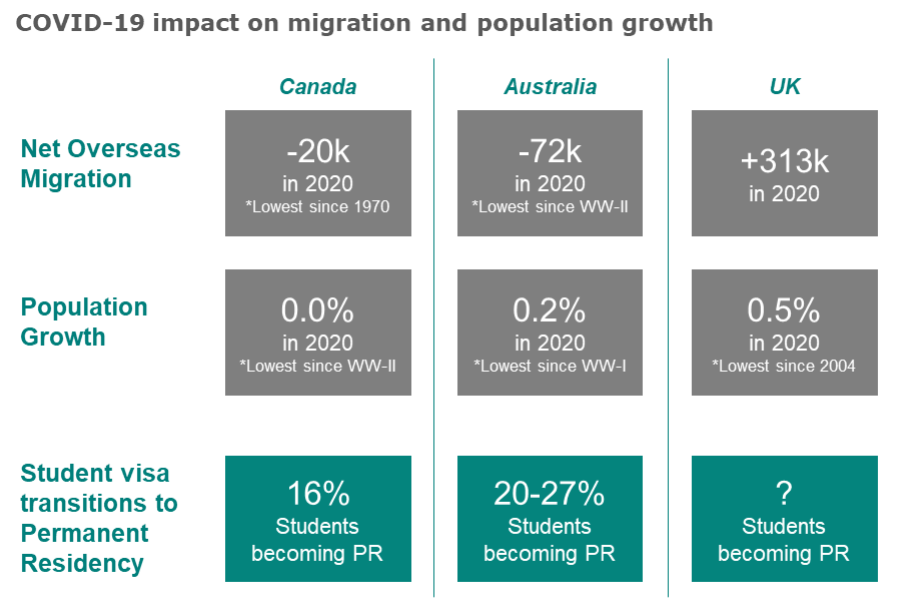
Road to Recovery: Reason to be optimistic #4
While the pandemic continues to cause uncertainty for the mobility of international students and the short-term future of the global education sector, you could be forgiven for having a pessimistic outlook. However, our Road to Recovery work which considers global data trends from across the sector and insights from our own agent community, gives us reason to feel more confident about the recovery of international education.
In this series of Insights pieces, Jon Chew (Head of Strategic Insights and Analytics at Navitas) shares five reasons to be optimistic, which were initially shared at the Navitas Virtual Business Partners Conference held in January 2021.
Reason to be optimistic #4: As part of the economic recovery, pro-migration policies will emerge
For many developed countries, population growth is a key driver of economic growth, and in most cases this population growth is driven primarily by migration. To take a very prominent example, 63% of the growth in the population of Sydney over the last 20 years has been due to migration.
In the pandemic, population growth has of course slumped to record low levels. While the UK has been much less affected, population growth in Australia is at the lowest levels since World War I, and Canada sits at 0% this year. The governor of the Reserve Bank of Australia recently stated, “This slower population growth has a direct effect on the size of our economy and means that we will not get back to the previous trend any time soon. In per capita terms, we expect more, but not all, of the lost ground to be made up.”
Source: Centre for Population 2020, StatCan, ONS
Weak population growth and skills shortages will act as a drag on the economic recovery and future economic growth. There is growing pressure to connect the dots between population growth, migration and economic growth as a way to accelerate the post-pandemic recovery. Many studies have shown that young, skilled migrants drive job creation and boost productivity, are net contributors to the public purse through taxation, and offset the challenges of aging populations.
Ensuring we are doing our best to fill critical skill gaps that cannot be met in the short term within Australia will help to ensure that migration supports our economic recovery. On this front, there is room for improvement.
— Melinda Cilento, Sydney Morning Herald, 27 September 2020
As is often the case of late, Canada has been the first to make moves in this area. In late 2020, the Canadian Government announced increased targets for 1.23 million new permanent residents in the period from 2021 to 2023. In January 2020, Canada also announced that international students on post-graduation work permits would have the opportunity to apply for a further 18 month extension.
The UK is not far behind, and is likely to follow with major expansionary reforms as part of its post-Brexit points-based skilled migration model.
In a somewhat unexpected announcement, the Australian government launched a parliamentary inquiry into Australia’s skilled migration program in February 2021, including whether any “immediate adjustments” might be necessary in the context of the pandemic recovery. The inquiry will specifically examine “Australia’s international competitiveness in attracting entrepreneurs, venture capital, start-ups, and the best and brightest skilled migrants with cutting edge skills”.
Population growth and the demand for skills and talent have long been drivers of economic growth, but with a global recession and slump in migration caused by the pandemic, both are expected to become significant priorities for governments tasked with economic recovery. International education will be an important part of the recovery strategy.
This Insight article is one in a series of five reasons to be optimistic. Read the full article here.





